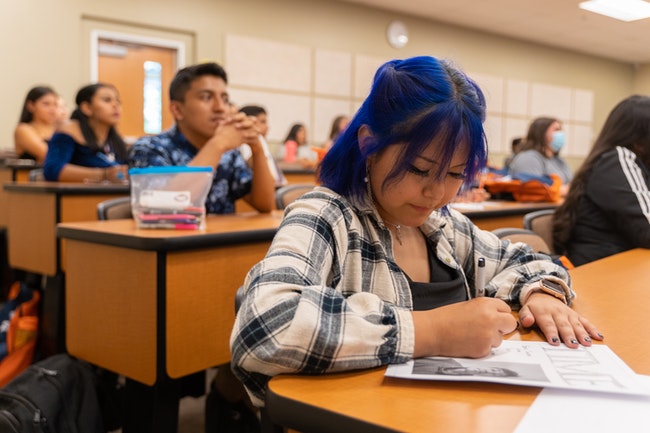
A student edits a friend’s magazine cover during the magazine showcase at the Oregon Migrant Leadership Institute held at Treasure Valley Community College. (ANGELINA KATSANIS/The Enterprise)
ONTARIO – More than 100 middle and high school students from migrant and seasonal farmwork families across eastern Oregon gathered the past three weeks for the annual
Oregon Migrant Leadership Institute program at Treasure Valley Community College.
Project Director Greg Contreras, who is from Ontario and now manages the College Assistance Migrant Program at Portland Community College, said the program was “helping our students understand their potential, that they are leaders” and to push “educational access – it doesn’t end with high school.”
Last year, the institute team conducted a version online, but Contreras said the crew was happy to be back in person this summer.
The free program serves a majority Latinx student body. The institute is designed as a residential program, where students get the college experience of living and working on TVCC’s campus. But this year, because of Covid spacing requirements, only students from outside Malheur County fit in the dorms.
The program provides younger students access to mentors who are college students with migrant and seasonal farmwork backgrounds. This summer, 12 mentors came from seven colleges and universities. They stayed with the program through all three weeks, playing a crucial role in mentoring each of the three weeklong cohorts of around 40 students.
“I quickly recognize, along with the mentors, how scary it is for a lot of our students to be the first in their family to graduate from high school,” said Contreras. “Many of our students are going to be the first in their family to assume a different career.”
Contreras said that many students sacrificed a week’s pay at summer jobs, including in the same fields where their parents work, to attend the institute.
“We tell them that we can turn that $300 (lost) into $50,000 or $70,000 in scholarships,” said Contreras.
“I love that mindset of our students, coming in knowing that we can help give them choices, knowing that we can give them a career that is more long term,” Contreras continued. “If there’s a career out there, it’s our job to help them understand, ‘Let’s help you lay out these steps,’ so they start to honor what they’re interested in doing.”
That mission was made explicit during an activity where students drew themselves in a future setting, imagining they were on the cover of a trade magazine being honored for career achievements.
One by one, the students stepped to the front of the lecture hall with their artwork and passed it onto the projector. They then spoke publicly in front of their group, answering questions from two mentors about why they hoped to pursue the career of their choice, their biggest motivation, and what they hoped to give back to their communities.
After each presentation, the mentors would affirm that the student’s dreams were within reach, and then remind the audience to applaud.
Omar Ortega, 15, is a sophomore at Ontario High School who said his dream was to become a professional skateboarder. He said he had been to the leadership institute once before, as a middle schooler, and was glad to be back this summer.
“I wanted to come back because OMLI’s like, really fun,” he said. “I wanted to try it again, and I wanted to learn more about college stuff too, for my future.”
Ortega said his older brother is currently a college student in Corvallis and that he has hopes of going to college as well “if I believe in myself.”
According to Ortega, the best part of the week is the social aspect.
“I get to see my old friends and I get to meet (some) of these new people,” he said. “It’s amazing to make new friends.”
Yerika Marquez, 18, one of the mentors, highlighted how the social aspect of the leadership institute can help students pursue their education. Marquez, a sophomore double majoring in international studies and sociology at the University of Idaho, said that she had spent her freshman year learning about the education gap between Latinx students and their peers.
“Programs like this are a great way to get students involved in their education,” she said. “Throughout the program there’s activities that are introducing them to college and scholarships, but they’re also building connections and forming relationships. That can really help them in the future.”
That’s true even for students like Oscar Madrigal Macías, 15, who traveled three hours from Umatilla High School to attend the institute. Though he originally joined the program simply because “I didn’t want to be home,” he said that in the end, he had fun.
“I got to meet more people,” he said.
Ulises Trujillo García, 23, is a former program mentor from Nyssa who is currently a senior studying civil engineering at Boise State University. He gave the keynote speech on Friday, telling how his background in farmwork had served him in his pursuit of a career in academia.
“(OMLI) allows for many students to see their potential, to learn things about college that they didn’t know existed,” said Trujillo. “It also allows for students to feel welcomed, and in a safe space.”
News tip? Contact reporter Liliana Frankel at [email protected] or 267-981-5577.
SAFEGUARD YOUR LOCAL NEWS
Take one action today to help the Enterprise grow and do more for the community through accurate, fair reporting.
SUBSCRIBE: A monthly digital subscription is $5 a month.
GIFT: Give someone you know a subscription.
ONE-TIME PAYMENT: Contribute, knowing your support goes towards more local journalism you can trust.




